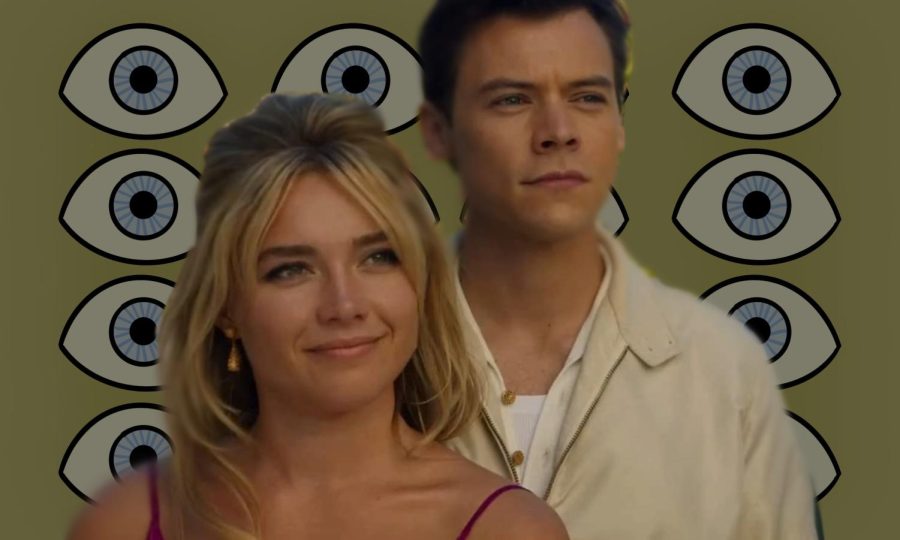Reel Thoughts: The doomed fate of ‘Don’t Worry Darling’
The movie released Sept. 23.
October 2, 2022
Warning: This story contains spoilers.
For the past few months, it felt like you couldn’t go on the internet without reading something new about “Don’t Worry Darling,” Olivia Wilde’s sophomore film. And whether it was spitting, smooching or set squabbles, the internet has been eating it up. But was the fuss actually worth it?
“Don’t Worry Darling” is a (wannabe) psychological thriller about a married couple, Alice (Florence Pugh) and Jack (Harry Styles), in a seemingly utopian community called Victory. During the day, the men of the town leave to work on an elusive project, helmed by Victory’s creator Frank (Chris Pine), while the women clean, socialize and prepare dinner for their husbands. Alice and Jack are perfectly content in this 1950s-stylized suburbia until, bit by bit, Alice notices her reality begin to unravel.
The internet’s obsession with the film began after Styles was cast as a lead. What started as an eagerly anticipated casting choice quickly devolved into apprehension after a clip of the film drew attention to Styles’ subpar acting abilities — especially compared to his costar Pugh.
The drama didn’t stop there. After all, you just don’t get Hollywood nonsense like this anymore. Every time I logged onto Twitter, there was something new. Rumors that Pugh had to direct scenes because Wilde and Styles were off canoodling. Contesting reports over whether Wilde fired the original lead actor Shia LaBeouf. Finally, some pretty interesting quotes by Wilde on directing sex scenes focused on female pleasure (more on that later).
Given the buzz preceding the premiere, it was deeply disappointing how the film was just so meh.
As an avid consumer of sci-fi, psychological thrillers and pretty much anything that feels like it would belong in a “Black Mirror” episode, I was deeply underwhelmed by the narrative. Between plot holes, slow pacing and predictable twists, it didn’t feel like there was a real psychological element to the purported psychological thriller. To make matters worse, I left the theater more confused than before.
After Alice’s suspicions about Victory led to involuntary electroshock therapy, she begins to see visions of herself as a surgeon in the present day, struggling to make ends meet and constantly fighting with Jack, who is unemployed (and probably an involuntarily celibate, “incel” man). She learns Victory is just a patriarchal simulation and that Jack has forced her into it with hopes of creating their perfect life together. Understandably, Alice is furious Jack has taken away her autonomy. She kills Jack and attempts to escape Victory, with the film ending on the sound of Alice gasping for air.
Given the lack of worldbuilding outside of Victory, the film’s commentary on the patriarchy feels boring and contrived. The majority of the cast is white, and any characters of color have minor roles. It veers pretty close to the “The Handmaid’s Tale,” which has come under scrutiny for extrapolating the issues faced by Black women onto white women. What is the film saying about the patriarchy, other than that it exists? I think we’re all aware of that already.
Therein lies my confusion about the film’s message. The dramatic technological reveal makes me question if “Don’t Worry Darling” is trying to say something about the society we live in — a la “Black Mirror” — or if this is just another hyper-aestheticized, predictable movie about a person fleeing a place they don’t want to be in. Okay, cool. Alice has escaped this incel community, but then what?
Furthermore, because Victory is centered around male pleasure, it seems contradictory that Wilde would focus her sex scenes on female pleasure. Is she trying to defend Jack’s actions, claiming it’s all for Alice? If you’re making a film about why the patriarchy is bad, why would you repeatedly show the women feeling pleasure? This frequent dissonance between director and story further clouded my understanding of the film’s message, and I could only be distracted by Styles’ tap dancing for so long.
Still, there were some enjoyable parts to “Don’t Worry Darling.” My favorite thing about the movie is, like, it feels like a movie.
Email: [email protected]
Twitter: @yikesmeher
Related Stories:
— Reel Thoughts: ‘A League of Their Own’ is a baseball show that finds its beating heart off the field
— Reel Thoughts: “Do Revenge” ushers in a new age for teen comedies
— Reel Thoughts: ‘Doctor Strange in the Multiverse of Madness’ is campy fun, but also underwhelming


